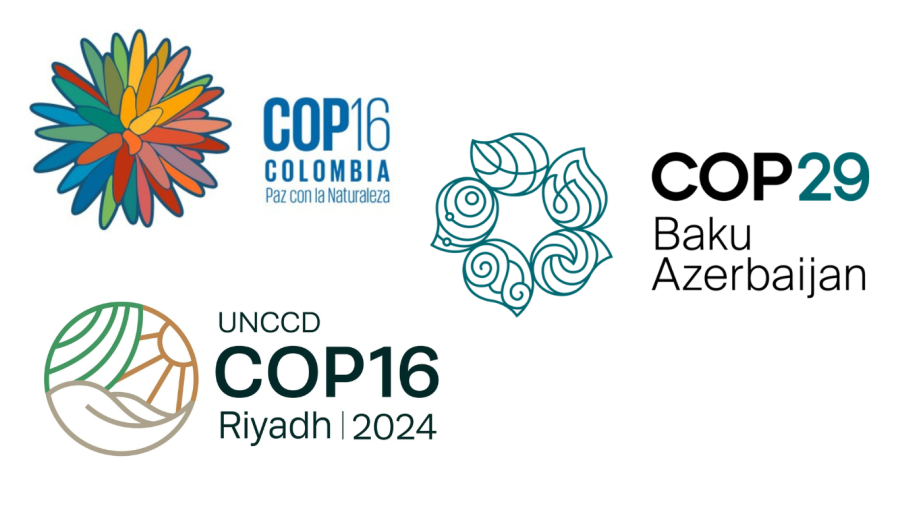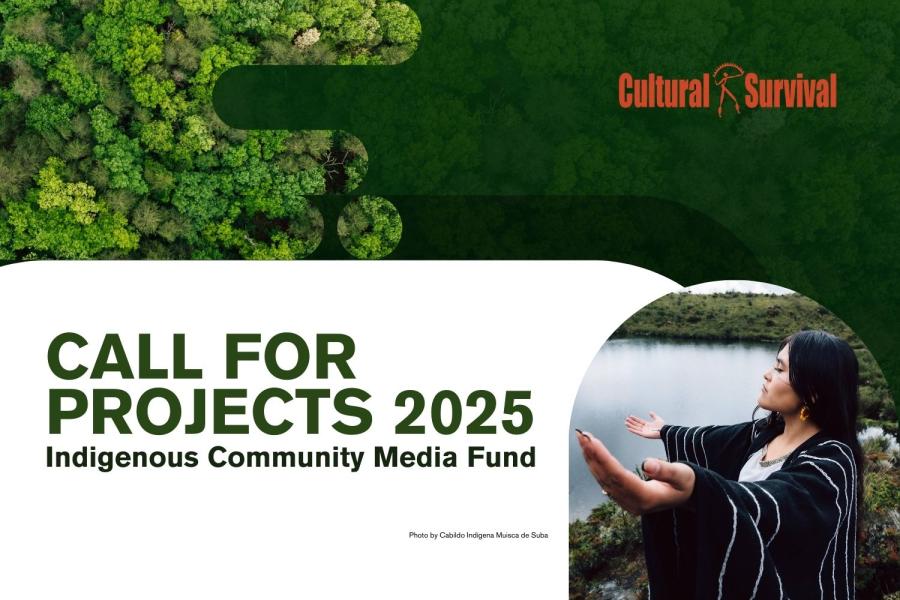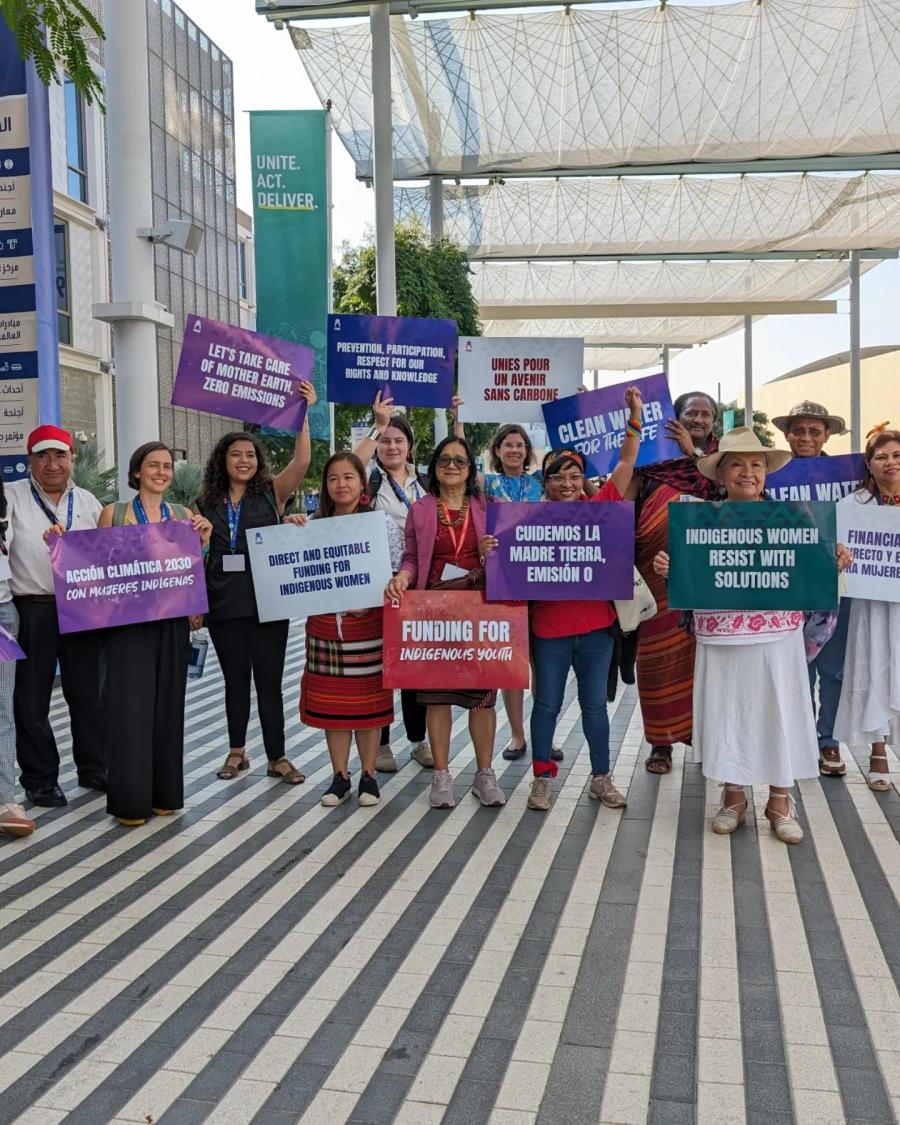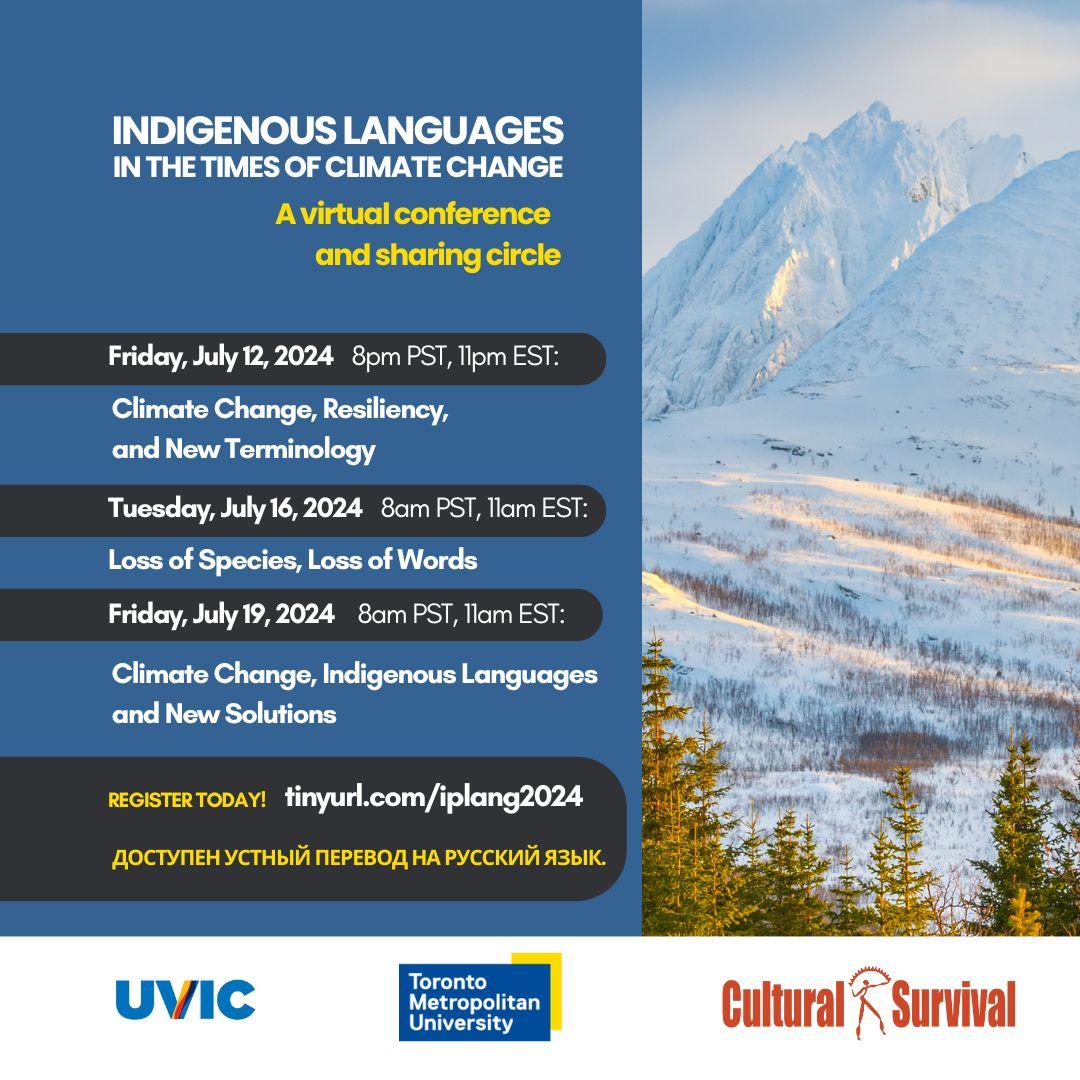
Registration: tinyurl.com/iplang2024
Join us at a virtual conference and a sharing circle on Indigenous Languages in the Times of Climate Change. This conference is a joint effort of the Department of Anthropology, University of Victoria BC, Department of Sociology, Toronto Metropolitan University, and Cultural Survival. This conference is hosted with the goal of having focused discussions around the impacts of climate change on the state of Indigenous languages. Convene on Friday, July 12; Tuesday, July 16; and Friday, July 19, 2024, for three 2.5-hour long meetings (specifics of the program addressed below), participants will discuss key questions of how climate change impacts and transforms the resiliency of Indigenous languages, what new terminology is developed under the pressures of climate change, and what new solutions are formed within Indigenous languages to address climate change.
Indigenous languages are foundational indicators to the state of biodiversity of our planet. According to the UN estimates, by the year 2100, more than half of the world's languages will become extinct, most of these languages being Indigenous languages. Climate change is among the many reasons for the loss of languages and biodiversity. With climate change, language repositories are burning both symbolically and physically, impacting cultural landscapes, subsistence seasonalities, food sovereignty, and mental health of Indigenous Peoples across the globe.
This conference will gather Indigenous knowledge keepers from diverse regions who are witnessing and experiencing the impacts of climate change. Stewards of Indigenous lands and waters who are on the frontlines of climate change to share their voices, stories, observations, and ideas are invited to participate. The conference is being held to gain deeper understanding of the vulnerability and resilience of Indigenous languages to climate change and to strengthen relationships of Indigenous language and climate leaders, so that Indigenous voices are amplified in future climate change agendas. The conference will be held on zoom in English and Russian. The conference "Indigenous Languages in the Times of Climate Change: Virtual Sharing Circle" is supported in part by funding from the Social Sciences and Humanities Research Council.
Sessions will cover the following topics:
Day 1: Climate change, resiliency, and new terminology
Friday, July 12, 2024, 8pm Pacific time, 11pm Eastern time
For European territories: Saturday July 13 6am Moscow, 10am Tomsk, 12pm Yakutsk, 3pm Kamchatka.
What is climate change and how resilient are indigenous practices, knowledge and language to it? What are the links between climate change and changes in indigenous languages, for example, the formation of new words, terms and concepts in indigenous languages?
Speakers: Dr. Aresta Tsosie-Paddock, Dr. Manuhuia Barcham, and Viacheslav Shadrin
Dr. Aresta Tsosie-Paddock
Dr. Aresta Tsosie-Paddock, is a citizen of the Navajo Nation from Sand Springs, Arizona. She is an Assistant Professor in the Department of American Indian Studies (AIS) and Linguistics at the University of Arizona (UArizona). Her scholarly work is centered on American Indian/Indigenous in the areas of displacement and dispossession, language revitalization and pedagogies, urban studies, history and philosophy. She is a Center for University Education Scholarship (CUES) Distinguished Fellow at UArizona.
Dr. Manuhuia Barcham
Manuhuia Barcham, PhD (Ngāti Hori & Ngāti Hineiwaerea) is New Zealand Māori and is an Associate-Professor of Interaction Design at Emily Carr University of Art + Design. He is currently pursuing work on how immersive environments (XR/VR/AR) that may be used as part of Indigenous language revitalization efforts.
Viacheslav Shadrin
Institute for Humanities Research and Indigenous Studies of the North, the Russian Academy of Sciences. Vyacheslav Shadrin is a chief, Chair of Council of Yukaghir Elders. He takes an active part in indigenous movement in Russia since 1989 and is one of the leaders of the umbrella organization to indigenous peoples of Yakutia.
Day 2: Loss of species, loss of words
Tuesday, July 16, 2024 7am Alaska, 8am Pacific time, 11am Montreal In Europe July 16: 6pm Moscow, 10pm Tomsk, 12am Yakutsk
What is the link between climate change and language loss? What trends are we seeing in our indigenous communities? We seek to link biological and linguistic diversity among indigenous peoples in a broad understanding of aspects of culture, medicine, ceremonies, and other aspects based on existing examples.
Speakers: Shem Rose Qagughruk Koonooka, Nataliya Platonovna Izhenbina, Lynn Konwaia’tanón
Shem Rose Qagughruk Koonooka
My name is Shem Rose Qagughruk Koonooka and I’m from Gambell, St. Lawrence Island out in the big Bering Sea. I have been teaching as a Bilingual teacher for 24 years. It’s very crucial that our culture is carried on to the younger generation. I teacher my students how to make our regalia wear of all types from head piece to kameks (sealskin boots). I love children of all ages!
Nataliya Platonovna Izhenbina
Selkup Elder, daughter of a fisherman from the indigenous settlement of Ivankino, Tomsk region, Siberia.
Teacher of the native Selkup language and original culture of the Selkup people in the Tussayok mobile school. Representative of the indigenous Peoples Organization Kolta-Kup Kolpashevo.

Lynn Konwaia’tanón:we’s Jacobs
Lynn is Kanienkehá:ka of the Haudenosaunee Confederacy on her father’s side, adopted into the Turtle Clan, and mixed settler ancestry on her mother’s side. She lives and works from her home community of Kahnawà:ke, located on the shores of the St. Lawrence River near Tiohtià:ke (Montreal). Lynn spent more than two decades working in her community on land stewardship initiatives, habitat monitoring, mapping, protection, and restoration. She helped to establish a new Environment Protection Unit for the Mohawk Council of Kahnawà:ke and acted as its inaugural Director for five years, before joining the Jane Goodall Institute of Canada as Director of Programs, where she supported the organization’s decolonization goals.
This will be a bilingual conference in English and Russian. Each talking circle day will have three keynote speakers followed by sharing circle discussions. As a final outcome of this gathering we envision developing a published narrative that will present a collection of stories shared during the three meetings.
Day 3: Climate change, Indigenous languages and new solutions
Friday, July 19, 2024 at 7am Alaska, 8am Pacific time, 11am Montreal
In Europe: Friday 19 at 6pm Moscow, 10pm Tomsk, 12am Yakutsk
Summarizing the conclusions of the first two days and discussing how indigenous languages contribute to an effective response to the challenges of climate change. The future of indigenous languages is a key element of cultural revitalization, nature conservation and biodiversity, and community resilience; it paves new ways for climate solutions.
Speakers: Dr. Roza Laptander, Daanis Pelletier, Loreisa Lepine
Dr. Roza Laptander
Dr Roza Laptander is a native speaker of the Nenets language, one of the endangered Uralic languages of Siberia, Russia. Her research interests cover sociolinguistics, linguistic anthropology, documenting the Nenets language, and the spoken history of the Western Siberian Tundra Nenets. In her work, she writes about Nenets’ culture, language and customs in the tundra of northwest Siberia from an insider's perspective.
Roza holds a PhD in linguistics from the Herzen State University, Saint-Petersburg, Russia and a PhD in sociology from the University of Lapland, Rovaniemi, Finland. Her dissertation is based on the stories of the Nenets reindeer herders from the Yamal peninsula, Western Siberia. It shows that spoken stories and interviews concerning big changes in the tundra reflect a general mechanism of making Nenets official historical narratives.
Daanis Pelletier
Daanis Pelletier (she/her) is Anishinaabe from Fort William First Nation - an Ojibwe community located on the north shore of Lake Superior in Canada. As a sugar busher, advocate, and young leader, she aims to nourish and protect Indigenous nationhoods through promoting the resurgence of our inherent knowledge and legal systems; language, art, and food sovereignty practices. She is in her second year studying Indigenous Learning and Philosophy with a minor in Music. Daanis expresses her self care, love, values and relationships through her art of beading. Daanis is inspired by the environment, her mom, and her mentors.
Loreisa Lepine
Loreisa Lepine is the first officially recognized and “ongoing” Indigenous Land Steward at UVic. Loreisa’s role was built around advocating for the integral responsibility of Indigenous women in the transmission of knowledge outside and within restrictive colonial systems. Loreisa’s work involves the creation and prioritization of reconnection to land for Indigenous students in their homelands.
Share this invitation with your friends, relatives, communities, and organizations to register via this link. We are looking forward to fruitful dialogue and invite everyone to join this critical conversation.
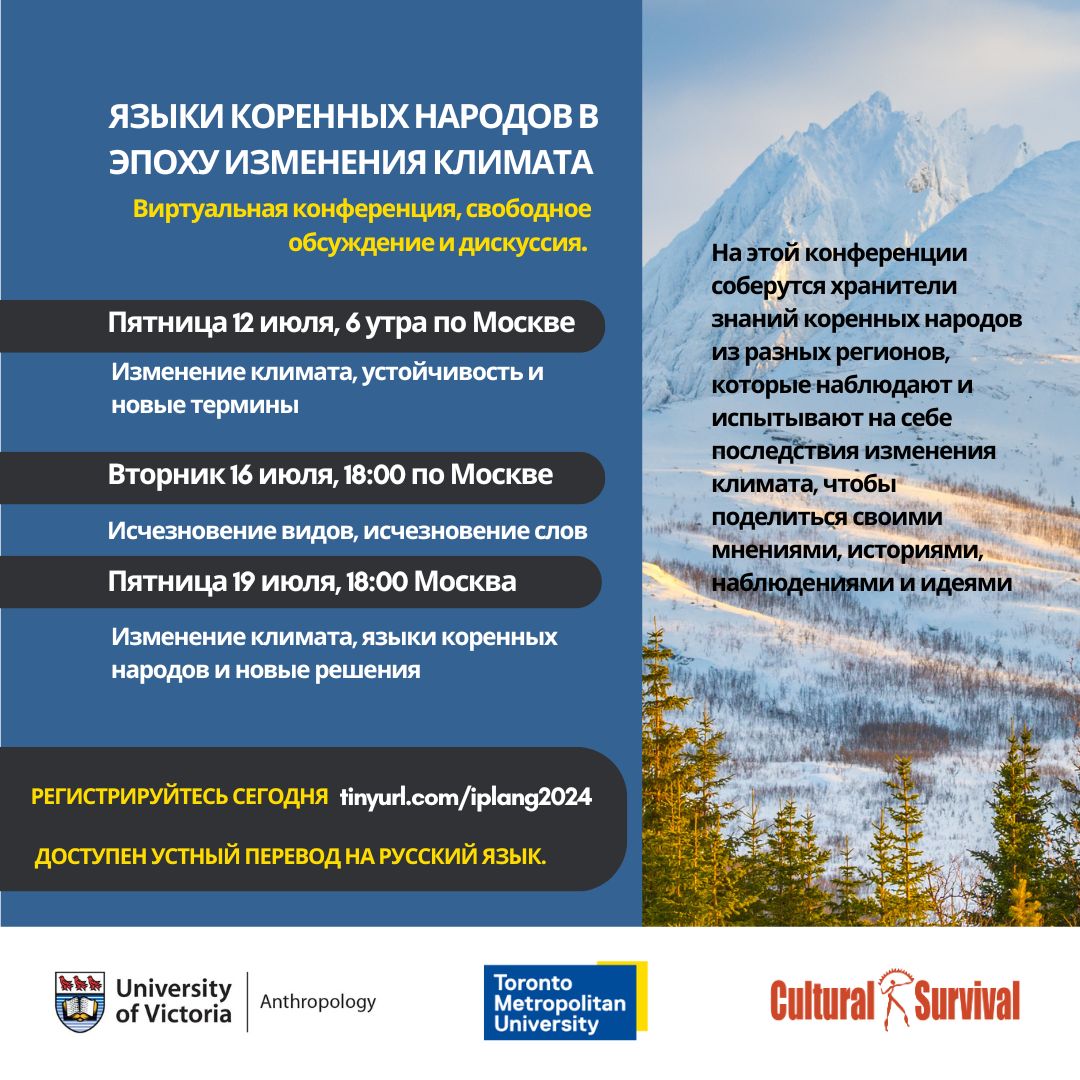
3-дневная виртуальная конференция и круг общения по языкам коренных народов во времена изменения климата: 12 июля (13 в Европе), 16 июля и 19 июля, 2024 года. зарегистрироваться по этой ссылке.
Языки коренных народов являются важными индикаторами состояния биоразнообразия на нашей планете. По оценкам ООН, к 2100 году более половины языков мира станут "спящими", причем большинство из них - языки коренных народов. Изменение климата - одна из многих причин утраты языков и биоразнообразия.
Эта конференция - совместная работа факультета антропологии Университета Виктории (Британская Колумбия), факультета социологии Университета Торонто Метрополитен и Организации Cultural Survival, занимающейся защитой прав человека коренных народов. Цель этой конференции – провести дискуссию о влиянии изменения климата на состояние языков коренных народов. В ходе дискуссии мы хотим ответить на ключевые вопросы о том, как изменение климата влияет на устойчивость языков коренных народов и трансформирует их, какая новая терминология появляется вследствие изменения климата и какие новые решения формулируются в языках коренных народов для борьбы с изменением климата.
На конференции соберутся хранители знаний коренных народов из разных регионов, которые в настоящее время наблюдают и испытывают на себе последствия изменения климата. Мы приглашаем распорядителей земель и вод коренных народов, которые находятся на переднем крае борьбы с изменением климата, поделиться своими мнениями, историями, наблюдениями и идеями.
День 1: 12 июля, 7 вечера по Аляске, 8 вечера по тихоокеанскому времени – в Европейской части - суббота 13 июля, 6 утра по Москве
Тема Обсуждения: Изменение климата, устойчивость и новая терминология
Обмен знаниями будет сосредоточен на изменении климата и устойчивости языков коренных народов. Мы предлагаем участникам подумать о связи между изменением климата, биоразнообразием и языками коренных народов. Как язык коренных народов реагирует на меняющуюся окружающую среду? Какие новые слова, понятия и терминология появляются, а какие понятия, происходящие из прошлого, могут пригодиться при решении проблем, связанных с изменением климата?
Основные докладчики:
- Ареста Тсоси-Паддок, народ Навахо, Аризона
- Манухия Барчам, Маори, Аотеароа
- Вячеслав Шадрин, Юкагир, Саха, Якутия
День 2: 16 июля, 7 утра по Аляске, 8 утра по тихоокеанскому времени
В Европейской части: 18:00 по Москве
Тема Обсуждения: Утрата биологических видов, утрата слов
Рассказы будут сосредоточены на связи между изменением климата и потерей языка. Какие тенденции наблюдаются в наших коренных общинах? Как изменение климата влияет на языки коренных народов в более широком смысле (аспекты культуры, медицины, церемоний и т.д.)?
Основные докладчики:
- Линн Конвайа'танон:мы'Джейкобс, Конфедерация Хауденосауни, Кахнава:ке
- Наталия Иженбина, Селькупка, Сибирь
- Шем Роуз Кагугрук Кунука, остров Святого Лаврентия, Юпик, Аляска
День 3: 19 июля, 7 утра по Аляске, 8 утра по тихоокеанскому времени –
В Европейской части 18:00 по Москве
Тема Обсуждения: Изменение климата, языки коренных народов и новые пути решения
Этот круг обмена опытом будет посвящен примерам вклада языков коренных народов в решение проблем изменения климата и окружающей среды. Какова роль языков коренных народов в разработке и планировании климатических решений?
Основные докладчики:
- Роза Лаптандер, Ненка, Сибирь
- Даанис Пеллетье, Анишинаабе, первая нация Форт-Уильям
- Лорейза Лепин, lək̓ʷəŋən, Виктория, Британская Колумбия
Конференция будет проводиться на английском и русском языках. В каждый день конференции будут выступать три основных докладчика, после чего состоятся обсуждения в "круге общения". В качестве итогового результата этой встречи мы планируем подготовить опубликованное повествование, в котором будут собраны истории, рассказанные во время трех встреч.
Мы просим вас поделиться этим приглашением со своими друзьями, родственниками, сообществами и организациями и зарегистрироваться по этой ссылке. Мы с нетерпением ждем продуктивного обмена историями и дискуссий и приглашаем всех присоединиться к этому важному разговору.
